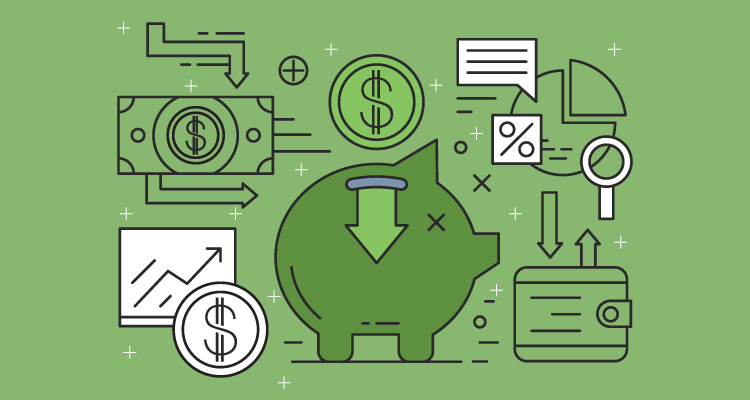What Is a Wealth Advisor?
I used to think “wealth advisor” was just a fancy term for “financial advisor” – like how some places call their janitors “custodial engineers.” Turns
An overwhelming majority of Americans ages 21 to 62 felt anxious or stressed about their financial situation before the COVID-19 pandemic. And, these feelings are most likely going to contine. What’s more, it’s been found that financial anxiety and stress are associated with low levels of financial literacy, problematic financial behaviors, and a reduced financial sense.
If you’re in that camp, then you’ve come to the right place. At Due, you can find numerous articles and guides that can assist you in improving your personal finances. And, one of the best ways to get started is by resolving the most common personal finance mistakes.
It may seem insignificant when you drive through Starbucks every morning, purchase a new one on your phone, or have dinner out. But those little expenditures add up.
Let’s say you spend $25 each week getting a cappuccino. That comes out to $1,300 a year! That could be used to pay off several extra credit cards or auto loans. And, it will be particularly important to avoid this mistake if you’re facing financial hardship after, like bankruptcy.
Rather than paying every month for items that do not need to be renewed, consider if you really need them. Cable television, music services, and high-end gym memberships are examples of services that require perpetual payments but leave you with little in return.
You can fatten your savings and cushion yourself from financial hardship by living a leaner lifestyle when money is tight or you just want to save more.
The use of credit cards for essential purchases has become quite common. It’s not wise financial advice to continue to pay double-digit interest rates on gasoline, groceries, and a host of other items that vanish long before they are paid in full. Even if an increasingly large number of people are willing to do so. Interest rates on credit cards increase the price of charged items substantially.
Ultimately, you may also spend more than you earn when you use credit.
When you don’t plan ahead for an unforeseen problem, you can easily turn a minor crisis into a full-blown disaster. A history of overspending, for example, puts people in a dangerous financial position. Since they depend on every dime they earn one missed paycheck could have serious repercussions. The last thing you want is to find yourself in this situation during an economic recession or when facing an emergency. If so, your options will be very limited if this occurs.
The general recommendation among financial planners is to keep three months’ worth of expenses in an account that can be accessed quickly. As an example, you may end up in a cycle of debt if your employment is lost or the economy changes. You could keep or lose your home depending on how much of a buffer you have.
Without earning income from the markets or other investments, you may not be able to retire. For a comfortable retirement, you need to contribute regularly to retirement accounts, such as a 401(k), IRA, or annuity.
You can increase your retirement savings via tax-deferred accounts or employer-sponsored plans. Consider the time your investments will need to grow, as well as how much risk you are willing to take. If possible, seek the advice of a qualified financial advisor.
To maintain a healthy financial future, it is essential to carry the appropriate insurance policies – including medical, auto, homeowners, long-term care, life insurance, and disability insurance. In spite of the difficulties of deciding which insurance and how much coverage you need, failing to have the right amount of coverage can be devastating if you suddenly incur a large expense.
What is happening right now affects your financial future. Most people consume endless amounts of time watching TV and browsing social media, but setting aside two hours a week for their finances seems impossible. However, it’s important to know where you want to go. As such, prioritize planning your finances right and keep monitoring your budget, credit scores, and credit reports.
In addition to the above, Due also has content focusing on topics like how to save money when buying a new car, how to protect yourself from a tax torpedo, the top motivating money goals, and the best ways to earn a passive income. There’s also advice on how to locate help if you’re in financial trouble and how to bolster your financial literacy.
I used to think “wealth advisor” was just a fancy term for “financial advisor” – like how some places call their janitors “custodial engineers.” Turns

Let’s talk about something that stops a lot of people from getting financial advice: the cost. You might imagine financial advisors as expensive professionals who

Here’s something that might surprise you: becoming a millionaire isn’t nearly as exotic or impossible as it seems. You don’t need to invent the next

Many people view retirement as the reward for decades of hard work, sacrifice, and perseverance. In many respects, it represents the moment when we finally

Would you believe that how you spend $5 can sometimes matter more than how you invest $5,000? It’s true because the small, intentional choices you

Every fall, millions of Medicare beneficiaries have the chance to take advantage of a critical opportunity. You can review your healthcare coverage, compare options, and

As a business owner, you have an assortment of retirement options. These range from the straightforward, think an Individual or Simple 401 (k), to the

I have a friend who has a pretty decent paying job. By that I mean she makes more than enough money where she’s not living
I can still vividly remember that first time it happened. It was right after a family dinner for my nephew when my dad leaned over

Despite its importance, money is one of the most avoided topics in families. A Fidelity survey of 1,900 adults ages 18 and up found that
Due makes it easier to retire on your terms. We give you a realistic view on exactly where you’re at financially so when you retire you know how much money you’ll get each month. Get started today.
To ensure we’re putting out the highest content standards, we sought out the help of certified financial experts and accredited individuals to verify our advice. We also rely on them for the most up to date information and data to make sure our in-depth research has the facts right, for today… Not yesterday. Our financial expert review board allows our readers to not only trust the information they are reading but to act on it as well. Most of our authors are CFP (Certified Financial Planners) or CRPC (Chartered Retirement Planning Counselor) certified and all have college degrees. Learn more about annuities, retirement advice and take the correct steps towards financial freedom and knowing exactly where you stand today. Learn everything about our top-notch financial expert reviews below… Learn More